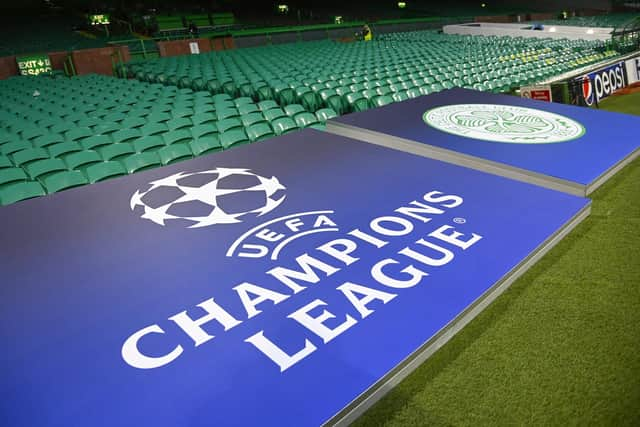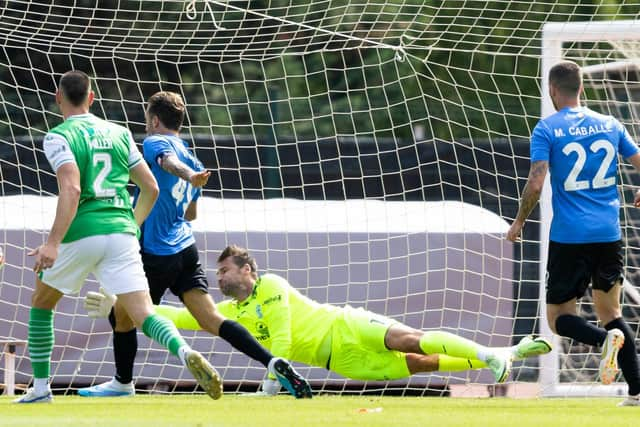Celtic, Rangers and Scottish football served coefficient wake-up call as Champions League spot evaporates
The news that the Scottish Premiership champions will no longer be guaranteed automatic entry to the Champions Legue group stages from next season will come as a bitter blow to both Celtic and Rangers. But it should also act as a wake-up call for the whole of Scottish football over the need for improved performances and results in Europe if the nation is to avoid slipping even further down the coefficient rankings.
Scotland has enjoyed a seat at the top table of UEFA competition over the past two campaigns, safe in the knowledge the league winners would qualify directly for the Champions League group stages and claim the £20m bonanza that comes with it. Celtic were the beneficiaries in 2021-22 and 2022-23 thanks to back-to-back titles won under Ange Postecoglou but finished bottom of their Champions League group phase both times, picking up just one victory across 12 matches. Rangers also took part last season after negotiating their way through the qualifying rounds but finished with zero points and the worst record of any Champions League side in the history of the group stages.
Advertisement
Hide AdAdvertisement
Hide AdThe guarantee of a Champions League spot for the Scottish league winners remains in place this season so either Celtic or Rangers will take their place in the newly-revamped competition for next season that will see group stages replaced by a single league table of 36 teams with a potential £50m prize money up for grabs. This also benefits other clubs in the Scottish Premiership, who receive higher solidarity payments from UEFA based on the number of teams participating in the Champions League.


But that guarantee will no longer be in place for the season after next after the Czech Republic moved above Scotland into 10th position in the UEFA coefficient rankings thanks to Viktoria Plzen earning a goalless draw away to Fiorentina in their Europa Conference League quarter-final first leg on Thursday.
Dropping to 11th means that, for the first time in three years, there may be no Scottish representation in Europe's elite tournament in season 2025-26. Celtic, if they win the league next term, will need to qualify via a play-off against a champion from a league outwith the top 10 such as Switzerland, Austria, Norway, Denmark or Ukraine.
Rangers, if they win the league next season, could still secure direct entry to the Champions League through the back door thanks to their high individual club coefficient, providing they are the top ranked team in the qualifiers and the Champions League winner qualifies automatically through their domestic league.
That would soften the blow for the Ibrox side, but concern remains over Scotland's coefficient trajectory with predictions the nation could slip even further down the rankings by the time the 2026-27 qualification parameters are set.


UEFA coefficients are calculated over a five-year period and the 2019-20 campaign, which accrued a significant points haul thanks to both Celtic and Rangers reaching the Europa League knock-out phase, will drop off next term. It means Scotland will need a strong performance in Europe next season just to maintain, let alone improve, on their position.
That places particular onus on both Celtic or Rangers – Scotland's two best resourced clubs by a considerable distance – punching their weight, or even above it, next season. That would entail, at the very least, both clubs remaining in Europe beyond Christmas.
Few would argue that Rangers – barring the Champions League disaster last season – have not pulled their weight in contributing to Scotland's coefficient ranking with their run to the Europa League final in 2021-22 and reaching the last 16 of the same competition on three other occasions over the past five years accounting for a large chunk of the coefficient tally. Celtic undoubtedly need to do more having endured a miserable Champions League record and failing to win a knock-out tie in Europe in 20 years.
Advertisement
Hide AdAdvertisement
Hide AdBut the three other SPFL representatives in Europe next season – which will almost certainly be Hearts plus two from Kilmarnock, St Mirren, Dundee, Hibs, Motherwell and Aberdeen – also need to step up and contribute. Easier said than done considering the clubs they will face on the continent are often financially superior, particularly in the latter qualifying rounds.
This season, Aberdeen were Scotland's highest non-Old Firm contributors to the coefficient with one win and three draws in the Europe Conference League group stages having lost their Europa League play-off to BK Hacken. Hearts and Hibs both failed to reach the group stages, going out to PAOK and Aston Villa respectively after landing two difficult draws in the Europa Conference League play-off rounds.
Few would blame the two Edinburgh clubs for going out to those two clubs, but Hibs also suffered a first leg away defeat to Andorran minnows Inter d'Escaldes, while last season, Motherwell were dumped out by Irish outfit Sligo Rovers. These kind of results have to be eliminated if Scotland are to recover their coefficient.
Crucially, the guarantee of a Europa Conference League group stage in 2025-26 will remain in place for the winners of next season's Scottish Cup since Scotland remain ranked among the top 12 leagues. The following season, however, is looking more ominous as Scotland will start the rankings in 16th place giving the five Scottish clubs in Europe next season a clear mandate to propel the nation back up into at least 12th place.
If that fails to materialise, then the guarantee of European group-stage football for the Scottish Cup winners will also be gone for season 2026-27 with two qualifying rounds required to get there. Next season looks like being make-or-break for Scotland on the European stage.
Comments
Want to join the conversation? Please or to comment on this article.
